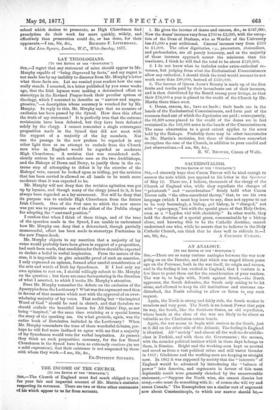THE INCOME OF THE CHURCH.
[TO TUB EDITOR OF THE "SPECTATOR."]
Sin,—The Church of England must feel much obliged to you for your fair and impartial account of Mr. Martin's statistics respecting its revenues. There are two or three other statements of his which appear to us far from accurate.
1. He gives the income of deans and canons, &c., as £347,000. Now the deans' incomes vary from 2700 to £2,000, with the excep- tion of the Dean of Durham, who as Warder of the University has .£1,000 a year additional. Canons' incomes vary from £350 to £1,000. The other dignitaries, e.g., precentors, chancellors, and prebendaries, are all purely honorary, and as the majority of these incomes approach nearer the minimum than the maximum, I think he will find the total to be about 2123,000.
2. I do not know what he includes under extra-cathedral re- venues, but judging from what the Ecclesiastical Commissioners allow any cathedral, I should think the total would amount to not much more than 280,000, instead of 2130,000.
3. The income of Queen Anne's Bounty is made up of the first fruits and tenths paid by their incumbents out of their incomes, and is then distributed by the Board among poor livings, so that their 134,000 a year is placed to the credit of the Church by Mr. Martin three times over.
4. Deans, canons, &c., have no lands; their lands are in the
hands of the Ecclesiastical Commissioners, and form part of the common fund out of which the dignitaries are paid ; consequently, the 68,838 acres placed to the credit of the deans are in fact contained in the 149,882 acres in the hands of the Commissioners. The same observation to a great extent applies to the acres held by the Bishops. Probably there may be other inaccuracies in Mr. Martin's statistics, but these of themselves somewhat strengthen the case of the Church, in addition to your candid and just observations.—I am, Sir, &c., It. W. BROWSE, Canon of Wells.


































 Previous page
Previous page